Our 4-day work schedule as volunteers at the Edge of the
Wilderness Discovery Center in Marcell, Minnesota, afforded us plenty of time
to sightsee.
We began our exploration in Grand Rapids, the start of the
47-mile stretch known as the Edge of the Wilderness Scenic Byway (EOWSB). Paper mills are a major industry here,
sitting along the banks of the Mississippi River. We walked along the waterfront trails and also
followed the art tour, admiring all the murals and creative designs placed around town.
 |
The Mighty Mississippi meandering through Grand Rapids.
|



Grand Rapids is the birthplace of Judy Garland. Her childhood home for 7 years is now part of
the Judy Garland Museum. Remarkably,
nearly 85% of the structure and furnishings are original to the home. Born as Frances Gumm into a show biz family,
Judy worked from age 2 alongside her two older sisters. Like the Kennedys, all the members of the
Gumm Family died young (under age 60), including Judy. She passed away at age 47 in
1969 after 45 years in the entertainment industry. Best known as Dorothy in the iconic film The
Wizard of Oz, Judy’s wages for that movie were $500/week. She was the lowest paid cast member except
for Toto the dog, who brought home $125/week.
We learned about the ruby slipper caper, where 1 of the 4 original pairs
was stolen right from this very Museum.
Not to worry, you can see another pair if you visit the Smithsonian in
Washington, D.C. Judy had a notable
career as an actress, singer, USO entertainer, and tabloid topic. She would have turned 100 years old the week
before we visited. I am glad we came to
this museum. I fear its appeal may soon
diminish, causing it to go the wayside like the Roy Rogers-Dale Evans Museum
(Branson, Missouri) and Liberace Museum (Las Vegas, Nevada).


 |
| A tribute to my Aunt Laurie, my very own Wicked Witch of the East (W.W.T.E.) |
It was our good fortune that weather postponed the
Independence Day festivities at Grand Rapids on July 4. So, we had the chance to meet some fine folks
from Wisconsin and witness the impressive fireworks display on July 5 at Pokegama Lake. We hiked within Grand Rapids on several
trails including a portion of the North Country National Scenic Trail. We have completed portions of this Trail in 3
of the 8 states through which it runs.
 |
| The boats lined up on Pokegama Lake to watch the fireworks display. |
We spent a day hiking and exploring the
Joyce Estate on Trout Lake. David Gage
Joyce inherited a portion of the lumber empire established by his father. From 1917 to 1935, David built a summer
retreat for his family on the banks of Trout Lake, although most of the 40+
structures were in place by the mid-1920s.
The remote lake retreat was named Nopeming, which means place
of rest in the language of the Ojibwe, the native Indian Tribe. The Adirondack-style main lodge and several
cabins all had electricity, indoor plumbing, and spacious rooms, quite upscale
for the time. Additionally, the property
had recreational facilities: golf
course, tennis court, bathhouse, greenhouse, and trap shooting gun house. David died at 52 years of age in 1937,
leaving Nopeming and the rest of his estate to his only child,
Beatrice. Beatrice continued utilizing
the property until her death in 1972 at age 49.
(Gee, this family all died young, too).
The property was sold to the Nature Conservancy and subsequently
acquired by the US Forest Service. I was totally psyched to tour this place. I read all about the Joyce family and their
logging endeavors in the book Timber Connections. I
viewed photos of the property from days gone by, with its manicured gardens,
ponds, and shade trees. And I didn’t
complain one little bit that the only way to access the complex from the
parking area is by foot along a 3.5 mile trail. There were lots of downed trees
from recent storms along the trail. But
nothing was stopping me. We got to the
end of the trail and then trudged through knee high grass to access the
structures. Sadly, only a half dozen
structures remain, and they are in desperate need of repair. In fact, a huge tree had fallen on the main
cabin. Despite leaving with 6 ticks on me, succumbing
to 13 mosquito bites, and being pooped from hiking 7 miles round trip, I was
glad we came. Speaking of poop, I
spotted some fresh bear scat, but I never ran into its owner.
 |
| Photos of the Joyce Estate from days gone by. The picture in the center is the Main Lodge. |
 |
| Here it is today, damaged by a fallen tree from recent storms. |
 |
| The Main Lodge and one of the remaining sleeping cabins. |
 |
| The forest has overtaken areas that once contained manicured gardens. |
 |
| View of Trout Lake from the shore. |
 |
| A stream along the trail to the Joyce Estate. |
We did some hiking at the Laurentian Divide, the highest
point along the EOWSB. The Divide was
formed 16,000 years ago by melting glaciers that eroded Minnesota’s mountain
range into curvy hills and formed thousands of waterways. Water on 1 side of the Divide flows north to
the Hudson Bay, while water on the other side flows to the Gulf of Mexico. I would just love to follow the raindrops to
witness this phenomenon!
We frequented Big Fork to hike along the Big Fork
Riverwalk Trail. I learned much about
the lumber industry at the town’s Interpretive Park. Back in the day, logs were floated down the
Big Fork River to mills. Small boats
called wannigans were equipped with supplies for the men charged with
guiding the floating logs. These men
were nicknamed River Rats! As one
“rat” to another, I found this exhibit fascinating. Big Fork may be an extremely small town
(population 446), but it has several restaurants, pubs, and even a Performing
Arts Center, where we attended an enjoyable theatrical presentation.
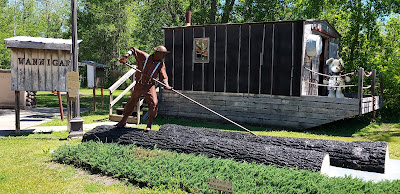 |
| The "River Rats" Exhibit |
 |
| All the comforts of home inside the wannigan. |
 |
| Spectacular clouds |
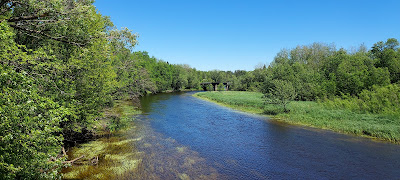 |
| The Big Fork River |
 |
Theatrical production, Gracie's Fowl Play
|
Yee Ha! We watched
all the cowboys and cowgirls showcase their skills at the North Star Stampede
in Effie. While most participants hailed from Minnesota, South
Dakota, North Dakota, Wisconsin, and Canada all had representation. We even had 1 participant from our Lone Star
State of Texas! From the barrel races to
bull riding to the antics of the rodeo clown, I enjoyed every minute. But nothing beats the steer wrestling! I was happy that the Stampede had a sold-out
crowd, and I was quite impressed with the level of respect and patriotism
exhibited by everyone during the National Anthem. Rodeo festivities included a parade downtown. With a population of only 123, I reckon every Effie
resident was involved in the event, whether as participant or spectator. It
was like Halloween for the kiddies with all the candy being distributed by hopeful
political candidates. Effie is the final
stop along the EOWSB and is a farming community. Who knew that Minnesota offers good soil and appropriate
climate conditions for growing spuds!
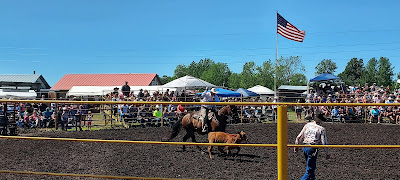 |
| Steer roping |
 |
| The rodeo clown |
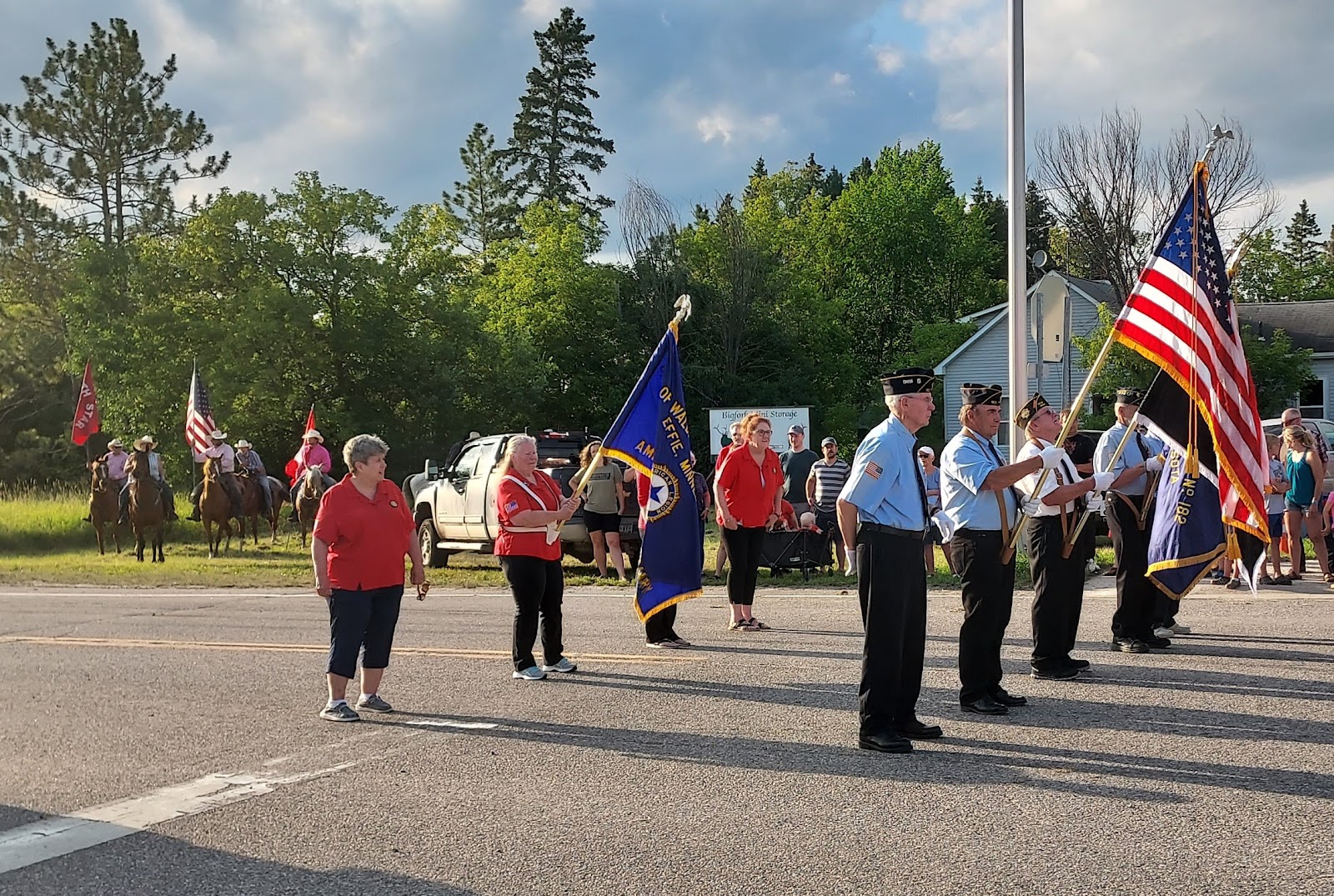 |
| Marchers in the parade |
 |
| One of the MANY political floats in the parade. I chose this one to display only because it had a giant stuffed toy like me as a mascot! |
Hibbing is a rather large city by Northern Minnesota
standards, so we visited on several occasions to view tourist attractions. At the Greyhound Bus Museum we learned how
Hibbing became the birthplace of bus transportation, from the 1914 Hupmobile to
Greyhound’s modern passenger luxury liners.
Greyhound’s motto, Leave the Driving to Us, will be stuck in my
head for a while.
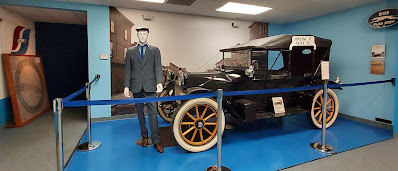 |
1914 Hupmobile
|
 |
| They even had a bus the perfect size for this Rambling RV Rat! |
 |
| The Bus Graveyard, Greyhounds from years gone by. |
While in Hibbing, we stumbled upon the Hull Rust Mahoning
Mine, which turned out to be a fascinating historic landmark. With its 8-mile max length, 3.5-mile max
width, and a max depth of 800 feet, it represents the world’s largest open pit
iron ore mine. It is often referred to as The Grand Canyon
of the North. Mining operations
commenced in 1896 and continue today.
 |
| Hull Rust Mahoning Mine is the world's largest open pit iron ore mine. |
 |
| This is one GINORMOUS Tonka truck! |
Hibbing’s most famous one-time resident was singer,
songwriter, Grammy winner, and 2016 Nobel Prize recipient, Bob Dylan. So, on another Hibbing visit we walked by Dylan’s
childhood home, glimpsed his local hangouts, and toured Hibbing High School,
from which he graduated. Built in 1924 at a cost of $4 million, the
School is quite impressive with its 4 1/2 floors of Italian architectural design. Inside is graced with solid marble front steps
and pillars, brass rails, and murals depicting the history of the U.S.A. and
Minnesota. But its most prominent
feature is its auditorium/performing arts center, modeled after New York City’s
Capitol Theater. Mom loved the brass and
crystal chandeliers and painted ceilings.
Its main floor and balcony seat over 1,800 people, one of which is an
infamous apparition who resides in Row J, Seat 47. He must have been on a potty break when we
were in the auditorium since he didn’t eject me when I sat in his chair. What I admired most about Hibbing High School,
however, was its tribute to the victims of 9/11. Though far removed from the horrific events
of that tragic day, the students here exhibited comfort and support to grieving
families 1,400 miles away.
 |
| Corner property that was the boyhood home of Robert Allen Zimmerman, AKA Bob Dylan. |
 |
| The Performing Arts Center--this ain't your average auditorium! |
We attended 2 enjoyable evening outdoor concerts at
Hibbing’s Bennett Park. one was Trop Rock (think Chesney, Buffet, etc.), and the other was comprised of original Country and Rock compositions. Each visit
to Hibbing included dining at Bach Yen, which offers Chinese fare freshly prepared and using no
MSG. Service is always responsive and
personable, portions are always generous, and all entrees are reasonably
priced.
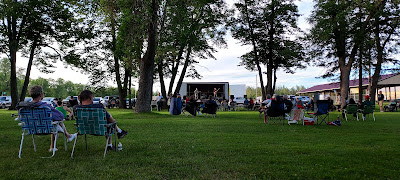 |
| One of the two outdoor concerts that we enjoyed. |
 |
| Liberty, a 200-lb Mastiff, enjoyed one of the concert with us. |
 |
| I loved the colorful decor inside Bach Yen... |
 |
| ...as much as the delicious freshly prepared food. |
If you are an avid bicyclist, you will love Chisolm, where
you can access the Redhead Mountain Bike Park and the Mesabi Trail. Since we have ‘Lectric bikes, we passed on
peddling along the Redhead, but we did purchase annual biking passes
($15/person) for the Mesabi (no pass is required if you choose to just hike). The Mesabi Trail is 145 miles long and runs
through 28 communities. We rode and
hiked through 4 towns over several sessions.
Chisolm is home to Iron Man, the 4th largest statue in the
US. As a tribute to the miners who built
our Nation during the Industrial Age, Iron Man stands 85 feet tall, weighs 4
tons, and has a waistband of 228 inches.
That’s one big boy! The Minnesota
Discovery Center is also within Chisolm.
It has several Norwegian and Sami cultural outdoor exhibits and has a
museum dedicated to Minnesota’s Iron Range.
Furthermore, it is an outdoor concert venue. On Thursdays from 3-5 p.m. throughout the
summer, it hosted Bands, Brew, and BBQ, wherein you could peruse the
museum and exhibits plus enjoy the performances of local musicians free of
charge. I was glad my parents’ volunteer
work schedule provided us the opportunity to participate in two of these
events.
 |
| Bicycling along the Mesabi Trail between Chisolm and Hibbing. |
 |
| Dad saved several turtles from hit and run injuries along the bike path. |
 |
| Veterans Park at the Minnesota Discovery Center. |
 |
| Grounds of the Minnesota Discovery Center. |
 |
| Replica of a sod house used by the Sami people. |
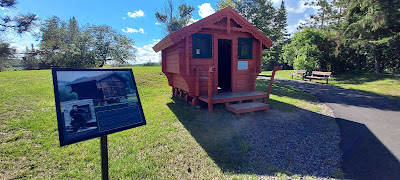 |
| Replica of a traditional Norwegian home. |
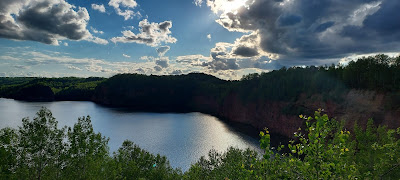 |
| What was once Hawkins Mine, the first mine in Itasca County. It operated from 1902-1962, extracting 25 MILLION tons of iron ore! |
We spent considerable time within Chippewa National
Forest. I learned Chippewa, established
in 1908, was the first National Forest east of the Mississippi River. Within Chippewa National Forest is the area
known as The Lost 40, which consists of red and white pines that date
back to the 1700s. The name references
the acreage of old growth trees that inadvertently were excluded from a land
survey completed in 1882, sparing them from being cut as timber. As we hiked the 1.5-mile trail, I was amazed
at the circumferences of these trees!
 |
| As we rode to The Lost 40, I spotted these pelicans hanging out near Turtle Lake. |
 |
| The Lost 40 Trail |
 |
| This guy didn't survive a storm. |
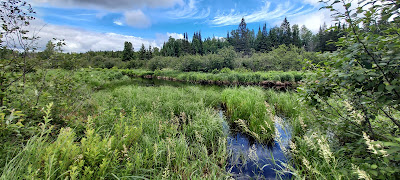 |
| View from the trail. |
 |
| Holy Havarti! That's one tall, rotund tree! |
Chippewa National Forest is home to several examples of the
master craftsmanship of the Civilian Conservation Corps (CCC). In addition to the wonderful structures right
on the grounds of the Edge of the Wilderness Discovery Center in Marcell that I showed you in my last post, we
toured the Supervisor’s Office in Cass River and the Ranger Station at Norway
Beach Recreation Area. As we travel
around the U.S.A., we realize that without the CCC, we would not have many of
the amenities within our National and State Parks. While it is important to provide those in
need with financial assistance, it is imperative that every individual lead a
productive life, one with purpose and with meaning. The CCC met both of these objectives in its
day. We really need to bring the CCC
back!
 |
| The rustic, hand-crafted interior of the Ranger Station at Norway Beach Recreation Area. |
 |
| The 3-story Supervisor's Office in Cass River. |
 |
| The interior of the Supervisor's Office is another fine example of the masonry and carpentry skills of the CCC. |
We purchased our Off Highway Vehicle (OHV) Permit and
explored several trails within Chippewa National Forest in Rat Patrol II, our
Polaris 570 RZR. We particularly enjoyed
traversing the B&B (Big Fork & Balsam) Trail, which is nicely maintained by
the Wilderness Wheelers, the local off-road club. This is one high-class Trail—it even has
porta-potties! Local businesses sponsor boardwalk
sections of the Trail. Sure glad we have
a smaller side by side since most trails within the Forest only are accessible
with 50-inch-wide units. We also checked
out Clubhouse and North Star primitive campgrounds within Chippewa National
Forest. We enjoyed meeting and chatting
with Lanette, the Host at Clubhouse, who would pop over weekly to EOWDC with her adogable English Mastiff, Maggie.
We would end each off-roading session with a meal at the Timberwolf Inn,
one of the only lodges in the Edge of the Wilderness area with a restaurant. And
they even have options for Dad’s plant-based diet. Chippewa National Forest has 925 miles of
streams, 400,000 acres of wetlands, and a whopping 1,300 lakes. Ironically, you don’t see many boaters on the
lakes and I figured out why: 1) Many of
the lakes are unnavigable, and 2) there is limited public access, so those
living lakeside have almost exclusive use.
 |
Wildflowers along the OHV trails.
|
 |
One of many deer who reside in Chippewa National Forest
|
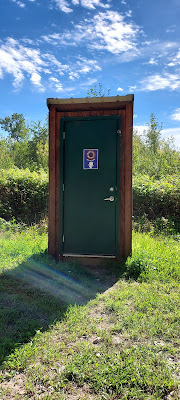 |
| The Big Fork & Balsam (B&B) Trail is quite upscale--it comes with porta-potties along its route! |
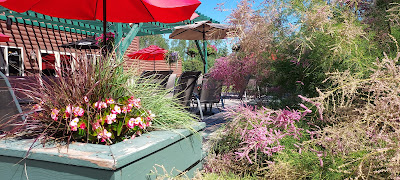 |
| The patio dining at Timberwolf Inn, our go-to eatery after off-roading. |
 |
| Lanette and Maggie |
The late Spring really delayed berry picking seasons in
Northern Minnesota. In mid-July we still
were gathering strawberries at Looney’s Berry Patch. Blueberry picking at Lavalier’s Farm did not commence until August 1. We made
sure we got there several times before leaving Minnesota.
 |
| Grounds of Looney's Berry Patch. |
 |
| Our strawberry pickins. |
 |
| The grounds at Lavalier's Berry Patch, where sunflowers abound. |
 |
| Looking good and ready for picking. |
We took a ride to Bemidji on 2 occasions along Lake County
Scenic Byway. Bemidji is headquarters
for all things Paul Bunyan. The tales of this lumberjack are vast and varied. It is said that he dug Lake Superior as a
watering trough for Babe, his blue ox.
Furthermore, his skill at cutting down acres of trees singlehandedly
within just a few minutes is legendary.
Ironically, New Jersey and Minnesota have something in common: they both have statues of this folk hero. NJ’s may be familiar to you: it was 1 of
the scenes as Tony is driving near the Pulaski Skyway in Jersey City during the opening credits of the HBO show The
Sopranos. Minnesota’s tribute to
Paul Bunyan is small in stature (only 18 feet tall) compared to Chisolm’s Iron
Man statue. On another visit we clocked
5 miles along the 115-mile Paul Bunyan Trail.
After both visits to Bemidji, we dined at Keith’s Pizzeria. Would you believe they offer a vegan pie with
non-dairy cheese? And it was simply
delicious, with its thin crust, browned but not burned. Who would have thought this possible in
Minnesota! Keith’s is a recipient of my
Rambling RV Rat 5-cheese award.
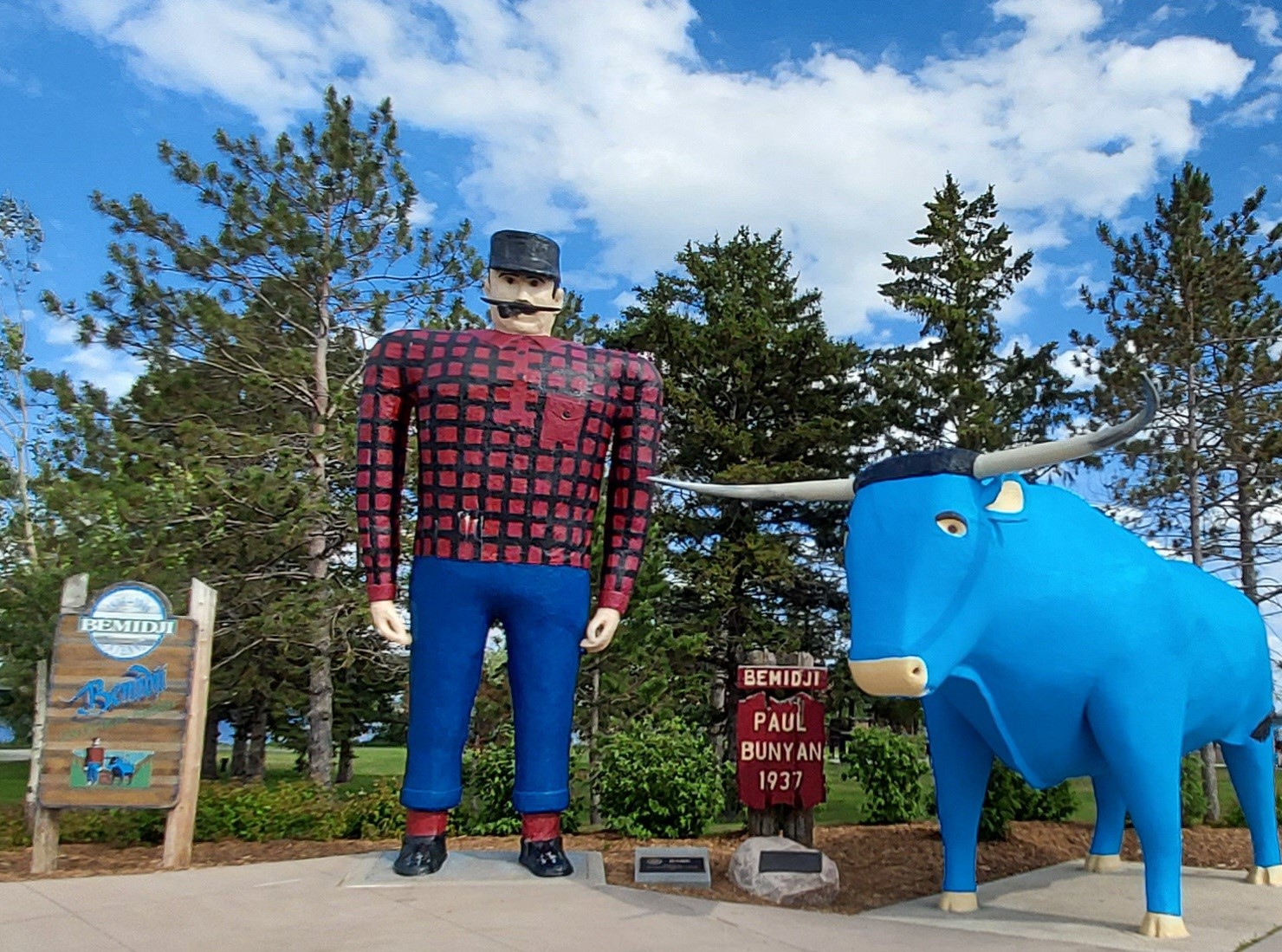 |
| Paul Bunyan and Blue Ox - Bemidji version. |
 |
| A very cool playground setup in the local park. |
 |
| Keith's vegan pie earns a coveted Rambling RV Rat 5-cheese award! |
We visited so many more places during our 8 weeks in
Minnesota. I’ll tell you about the rest
in my next post. Talk to you again soon!







































































No comments:
Post a Comment